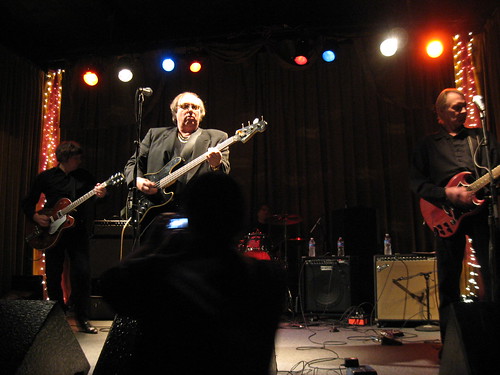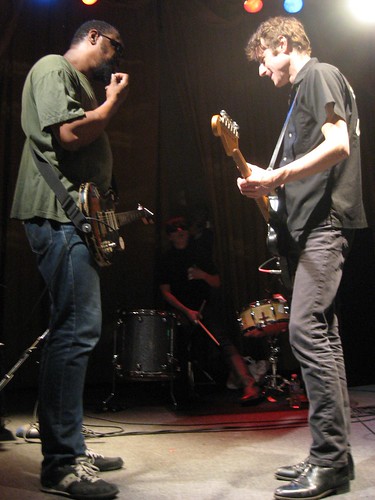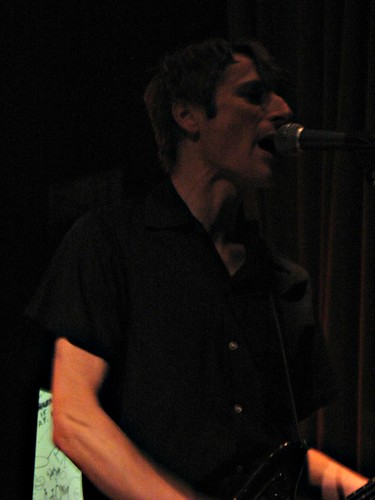This past Saturday night at the Beachland (a busy day for the venue on all fronts with four different events taking place) felt more like a package tour out of the 1950s than your regular a-headliner-and-two-openers show. The mirror ball was spinning, and New York DJ Mr. Fine Wine (check out his WFMU Friday night show Soulville) painted the scene with groovin’ chunks of early soul between sets.
Eddie Kirkland
Kirkland’s name might be a little obscure, but his history should make even the most casual music fan pay attention. Aside from his own modest hit “The Hawg” (released on Stax/Volt in 1963 under the name Eddie Kirk), Kirkland played second guitar for John Lee Hooker on a number of recordings throughout the ’50s and toured in Otis Redding’s live band for a while in the early ’60s.
After spending most of his pre-show time sitting behind his amp, waiting for his backing band (second guitar, bass guitar, drums and keys) to arrive, Kirkland suffered a little from a hurried soundcheck (this apparently stemming from the fact that the ballroom was occupied all day by Genghis Con). However, once he got going, he gathered an appreciative crowd from the still-sparse patronage of the ballroom. Kirkland specializes in a mix of electric dance blues and soul – the kind of music the encompassing term “rhythm and blues” was first invented to cover. On some songs, you could practically hear a horn section, and it was hard not to imagine the kind of show Kirkland could put on if he had the full band his music deserves. Building up steam throughout his set, it felt like Kirkland had really just hit his peak when his time was over, and the 87-year-old “Gypsy of the Blues” with the jewel-bedecked guitar exited the stage to the cheers of a now switched-on audience.
The Alarm Clocks
Formed in Parma, Ohio, in 1965, the Alarm Clocks took a long time off when guitarist Bruce Boehm was drafted into the army in 1967. Their music resurfaced in 1983 when their songs “Yeah” and “No Reason to Complain” were included on the first Back from the Grave compilation (a series credited with inspiring Jon Spencer to begin his career in music), and Norton Records released an Alarm Clocks album culled from early recordings in 2000. The band reformed in 2006 and have put out their second album since that time, Wake Up.
While the Alarm Clocks are a fully competent band and bass player/vocalist Mike Pierce has an impressive scream, their straight-ahead ’60s garage rock felt a little too straight-ahead to me, and my interest in the music waned as the set went on (not even to be re-awakened by a cover of Bo Diddley’s “I’m Alright”, though this may have been a cover of a cover given that the Alarm Clocks call it “It’s Alright”, just as Spacemen 3 did when they recorded the song). But it should be taken into account that I have never been the biggest fan of this style of music, and the band received an enthusiastic reception from many in the audience, including the Gories.
The Gories
Dan Kroha was going to have a good time with the Gories’ soundcheck whether the sound man liked it or not. The singer/guitarist/harmonica wailer is about 200 pounds of personality in a 100 pound frame and was a clear indicator that the Gories’ set of serious rockin’ was not going to be serious. As seems to be the case for any of singer/guitarist Mick Collins’ bands (see the Dirtbombs, the Screws, Blacktop, etc., ad naseum), energy was the name of the game.
Don’t know the Gories? Jack White sure does. Take a listen through the Gories’ catalogue, and you’ll easily catch the influence that the band – who formed in 1986, broke up in 1993 and reunited in 2009 – had on the White Stripes, right down to specific riffs.
Kicking off, appropriately, with “Hey Hey, We’re the Gories”, the Detroit three-piece – rounded out by Peg O’Neill on toms – immediately sawed into the skulls of the Beachland crowd (which seemed like it had gone through a complete rotation from the beginning of the night) with their trademark don’t-call-it-garage rock. They threw out songs like “Sister Ann”, “Feral” and “Telepathic” with bombast and love. Kroha looked like he was going to blow a nut as he wailed away on his harmonica during “You Don’t Love Me”, but, unfortunately, those of us positioned in front of Collins were unable to hear most of the fruits of Kroha’s labor (again, a less-hasty soundcheck would have been beneficial).
While the crowd was clearly a few steps behind Kroha, spurring him to comment midway through, “Oh, you liked that one, did you? Finally decided to wake up?”, they’d finally all caught up by the end. When the band returned for an encore, Kroha gave the audience the audience a loving middle finger before the Gories launched into a rowdy call-and-response version of “Thunderbird ESQ” and topped things off with “Nitroglycerine”.
Then, around 1:00 A.M., it was all over too soon. Like the best shows, the Gories leave you with excess energy and a jones for more, and I personally would be happy to see the Gories (and most any of Collins’ other bands) several nights in a row. And if you have even an inkling of interest in catching the Gories, don’t sit on it because Collins’ limited attention span – and the fact that O’Neill was reportedly pretty much done with the tour before it even began – may mean this reunion doesn’t last long.









